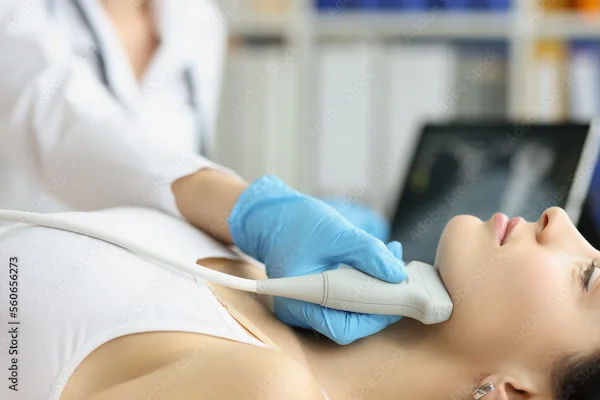How to Reduce TSH Levels in Females: Diagnosis, Treatment & More
Learn how to reduce TSH levels in females with diet, lifestyle changes, and medical treatments. Discover the causes and symptoms of elevated TSH levels, the importance of exercise and regular monitoring for long-term management.

Written by
Last updated on 3rd Jul, 2025
The thyroid gland is stimulated by the thyroid stimulating hormone (TSH), in response to which it secretes several hormones that control metabolism. Healthcare providers generally recommend TSH tests to assess the concentration of TSH in the bloodstream.
Normal TSH levels generally range from 0.4 to 4.0 milliunits per litre (mU/L). When TSH levels are elevated, it often indicates hypothyroidism. Whereas low TSH levels typically point to hyperthyroidism.
This article delves into the causes of elevated TSH levels in females, symptoms, diagnosis, treatment options and more.
Causes of Elevated TSH Levels in Females
TSH levels can be influenced by various factors such as age, sex, and pregnancy. Some key factors include:
Other medical conditions
Medications and supplements
Ethnicity
Time of day and season
Autoantibodies and heterophilic antibodies
Lifestyle choices and diet also affect TSH levels. Key factors include:
Smoking
Pollutants
Diet and iodine intake
Symptoms of Elevated TSH Levels in Females
High TSH levels are often a sign of hypothyroidism. Common symptoms include:
Fatigue
Numbness and tingling in the hands
Constipation
Unexplained weight gain
Sensitivity to cold
Heavy and frequent menstruation
Hypothyroidism can also affect mental and emotional well-being, resulting in symptoms like:
Depression
Reduced interest in sex
Diagnostic Tests for Evaluating TSH Levels in Females
Doctors use certain blood tests to check the proper functioning of the thyroid gland. They include:
TSH Test: A low TSH level indicates hyperthyroidism, while a high value indicates hypothyroidism.
Thyroxine (T4) Test: High T4 levels can indicate hyperthyroidism, while low T4 levels indicate hypothyroidism. Please note that pregnancy, oral contraceptives, and acute disease or treatment using corticosteroids can influence T4 levels.
Triiodothyronine (T3) Test: If T4 levels are normal but the doctor suspects hyperthyroidism, a T3 test may be conducted.
Thyroid Antibody Tests: These tests check for autoimmune thyroid diseases.
Additional diagnostic procedures include imaging tests for thyroid disorders. These tests are done in a hospital or clinic, and a radiologist examines the results. They include:
Ultrasound: Checks for thyroid nodules (lumps in the thyroid).
Thyroid Scan: A thyroid scan shows the size, shape, and position of the thyroid. It is mainly used to detect hyperthyroidism and thyroid nodules. This test should not be administered to women who are pregnant or nursing.
Radioactive Iodine Uptake Test: Helps identify hyperthyroidism by assessing the thyroid's ability to absorb iodine. It is not recommended for pregnant or breastfeeding women.
Get Your Thyroid Levels Assessed
How Do Thyroid Disorders Affect Other Hormones in Women?
Thyroid disorders can impact reproductive hormones. High TSH levels lead to menstrual irregularities and fertility issues. Here are a few hormonal effects of high TSH levels:
Oestrogen and Progesterone Imbalance: High TSH disrupts hormone balance, causing heavy or irregular periods. Additionally, low thyroid function lowers progesterone, leading to ovulation problems.
Thyroid Disorders and PCOS: Hypothyroidism increases insulin resistance, a key factor in Polycystic Ovary Syndrome (PCOS). It raises androgen levels, causing acne, weight gain, and hair thinning.
Complications of Untreated High TSH Levels
Ignoring high TSH can lead to these serious health issues:
Heart Problems:
Raises cholesterol and increases heart disease risk.
Causes slow heart rate and poor circulation.
Metabolic Issues:
Slows metabolism, leading to weight gain and fatigue.
Mental Health Effects:
Causes brain fog, depression, and poor concentration.
Goitre and Infertility:
Enlarges the thyroid gland and affects pregnancy outcomes.
Treatment Options for Reducing TSH Levels in Females
Medications for hyperthyroidism and hypothyroidism are distinct due to the differing nature of these conditions. Here’s an overview of the medications used for each condition:
Hypothyroidism: Treatment involves taking a daily pill containing a synthetic thyroid hormone.
Hyperthyroidism: There are several treatment options for an overactive thyroid:
Radioactive Iodine: Slows down thyroid activity
Antithyroid Medications: Prevents excess hormone production
Beta-blockers: Helps control a rapid heart rate caused by high thyroid levels
Surgery: Removal of the thyroid
Lifestyle modifications can help regulate TSH levels. A few suggestions have been provided below:
The natural rhythm of the body can be regulated through a regular sleep pattern. 7-8 hours of sound sleep is of utmost importance.
Reducing sugar and saturated fats helps with reducing weight (a common symptom of hypothyroidism).
Stress can be reduced by engaging in mindfulness practices like yoga, meditation, or therapy.
Exercising regularly improves mood and increases vitality.
Consult Top Doctors for Personalised Treatment
Dietary Adjustments to Lower TSH Levels in Females
To lower TSH levels, it is advised to make some positive dietary adjustments. Incorporating the following foods and nutrients can be beneficial:
Iodine: Essential for the synthesis of thyroid hormones. However, excessive amounts can be detrimental to people with autoimmune thyroid disorders.
Selenium: Prevents oxidative damage of the thyroid gland.
Zinc: Promotes hormone synthesis and thyroid function.
Vitamin D: Thyroid autoimmune diseases may be associated with vitamin D deficiency.
Vitamin B12: Individuals with hypothyroidism frequently have low levels of vitamin B12.
Magnesium: Helps thyroid function and may improve symptoms.
Iron: Low levels can affect thyroid function.
It is recommended to limit ultra-processed foods, gluten, and cruciferous vegetables (e.g., cabbage, Brussels sprouts).
Importance of Regular Exercise to Lower TSH Levels in Females
Regular physical activity can significantly help in lowering TSH levels. It helps in the following ways:
Assists in managing weight gain.
Boosts energy levels and reduces fatigue.
Improves mood and mental health.
Reduces the risk of depression.
Enhances heart health.
Strengthens muscles and joints, minimising joint pain.
Improves sleep quality.
Recommended exercises for hypothyroidism are as follows:
Walking
Cycling
Swimming & water aerobics
Strength training
Yoga & Pilates
Resistance training
Managing Stress and Its Impact on TSH in Females
Adopting stress management techniques can improve thyroid function and overall health. Here are a few tips to follow in this regard:
It is recommended to sleep for 7 to 9 hours.
Be consistent with the bedtime routine.
Cut down on screen time an hour before sleep.
Mindfulness practices like meditation or therapy lower stress.
Being outdoors can help beat stress.
Conduct soothing activities such as taking a warm shower.
Participate in painting or journaling.
Role of Supplements in Managing TSH Levels in Females
The thyroid gland relies on specific vitamins and minerals to function properly. Following are some of the essential ones:
Selenium: Helps with thyroid hormone production
Iodine: Important for the generation of the thyroid hormones T3 and T4.
Zinc: Aid the synthesis of T3, T4, and TSH
Iron: Required for the conversion of T4 thyroid hormone to T3, the active form of the thyroid hormone.
Other Nutrients: Vitamins A, B, and E play supportive roles in thyroid health.
It is suggested to get professional advice before self-prescribing any supplements aimed at improving thyroid function. Any nutrient deficiencies can be identified by a doctor, and the individual can get suggestions on the safest ways of addressing them.
Monitoring and Follow-Up Care to Reduce TSH Levels in Females
It is essential to see a healthcare provider on a regular basis to monitor and maintain a healthy thyroid. Here’s why:
Regular blood tests of TSH, T3 and T4 can be used to monitor thyroid function in the long term.
Changes in medication, diet and lifestyle can be recommended by a doctor as per the individual’s current condition.
Conclusion
Women can effectively manage their TSH levels with adequate care, preventing long-term thyroid complications. Proper medication and lifestyle changes are necessary to manage high TSH levels. Consistent exercise and a regular sleep schedule are important to maintain the optimal hormonal balance.
Furthermore, it is essential to ensure the proper functioning of the thyroid through routine check-ups and nutrition monitoring. Consulting a healthcare professional is crucial for personalised treatment plans and modifications in medication and diet based on the current condition.
Consult Top Endocrinologists
Consult Top Endocrinologists

Dr. Anand Ravi
General Physician
2 Years • MBBS
Bengaluru
PRESTIGE SHANTHINIKETAN - SOCIETY CLINIC, Bengaluru

Dr Venkata Naga Sai Tribhushan Rambhatla
General Physician
3 Years • MBBS
Bengaluru
PRESTIGE SHANTHINIKETAN - SOCIETY CLINIC, Bengaluru

Dr. Mary Susan K S
General Physician/ Internal Medicine Specialist
13 Years • MBBS, MD INTERNAL MEDICINE
Bengaluru
Apollo Clinic, Sarjapur Road, Bengaluru

Dr. Narayanan N K
Endocrinologist
16 Years • MRCP (Internal Medicine), SCE (Diabetology & Endocrinology), MRCP (Diabetology & Endocrinology), CCT, Former Research Associate, Cambridge University, Adjunct Professor, MGR Medical University, Tamil Nadu
Chennai
Apollo Hospitals Greams Road, Chennai
(925+ Patients)
Dr. Mohammad Sharfraz Ahamed
Endocrinologist
6 Years • MD GENERAL MEDICINE(KURNOOL MEDICAL COLLEGE), DM Endocrinology(SKIMS, Deemed university)
Nellore
Apollo Speciality Hospitals, Nellore
Consult Top Doctors for Personalised Treatment

Dr. Anand Ravi
General Physician
2 Years • MBBS
Bengaluru
PRESTIGE SHANTHINIKETAN - SOCIETY CLINIC, Bengaluru

Dr Venkata Naga Sai Tribhushan Rambhatla
General Physician
3 Years • MBBS
Bengaluru
PRESTIGE SHANTHINIKETAN - SOCIETY CLINIC, Bengaluru

Dr. Mary Susan K S
General Physician/ Internal Medicine Specialist
13 Years • MBBS, MD INTERNAL MEDICINE
Bengaluru
Apollo Clinic, Sarjapur Road, Bengaluru

Dr. Narayanan N K
Endocrinologist
16 Years • MRCP (Internal Medicine), SCE (Diabetology & Endocrinology), MRCP (Diabetology & Endocrinology), CCT, Former Research Associate, Cambridge University, Adjunct Professor, MGR Medical University, Tamil Nadu
Chennai
Apollo Hospitals Greams Road, Chennai
(925+ Patients)
Dr. Mohammad Sharfraz Ahamed
Endocrinologist
6 Years • MD GENERAL MEDICINE(KURNOOL MEDICAL COLLEGE), DM Endocrinology(SKIMS, Deemed university)
Nellore
Apollo Speciality Hospitals, Nellore






